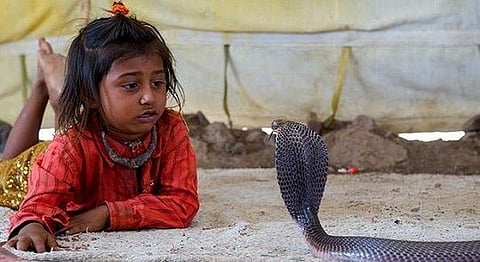
- HOMEGROWN WORLD
- #HGCREATORS
- #HGEXPLORE
- #HGVOICES
- #HGSHOP
- CAREERS
- ABOUT US
- CONTACT US

One of the many strong perceptions that the western world has about India is that it is a land of snake charmers. While we may not completely agree with that stereotype, a visit to this small hamlet in Maharashtra may make us think otherwise, or partly so. Shetpal, a sleepy village near Solapur, about 200 km from Pune is a village full of snakes — and they certainly are charmers.
The non-descript village of merely 2600 people looks normal from the outside with its kuccha houses and narrow lanes but has an eerie, bizarre feel to it. One of the main reasons Shetpal has so many varieties of snakes is because the region is dry and situated on the plains. They slither around in the village, inside people’s homes and even in classrooms during school hours. The people here are indifferent to the snake’s presence. The reptiles are worshiped by people and each house, no matter how tiny, has a hollow space called “Devasthan” meant for the snake/ cobra to visit, take rest and bless the family. It is a normal sight to see children playing along with snakes. The village apparently has a Siddheshwar temple where snake bite patients are brought in to be cured. The Gazetteers Department of Maharashtra states that in 1974 as many as 100 cases of snakebite are said to have been cured, but it was not known whether the snakes were poisonous or not.
However, not a single case of snakebite has been reported in the village itself. They say that the presence of so many snakes at one place can be due to the dry weather conditions. But another important reason could be respecting each other’s space.
You may or may not like snakes, but Shetpal makes for a must visit to experience the unique culture and observe the fantastic dynamics and the harmony between the snakes and the people.
Shetpal is located at a distance of 200 km from Pune and 350 km from Mumbai. The nearest railway stations is the Modnimb Rail Way Station. For more information on the varieties of snakes found in this region, visit this page.
If you enjoyed reading this article, we suggest you read:
